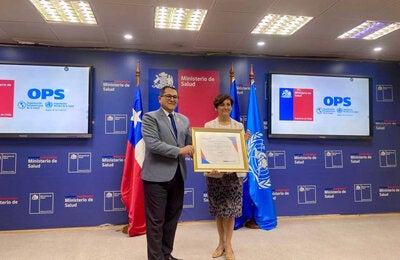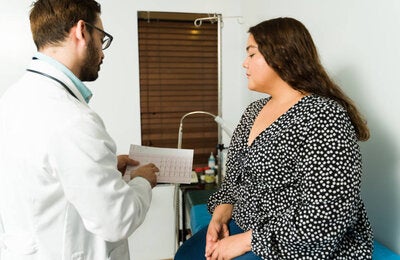Washington, D.C., 17 September 2012 (PAHO/WHO) - The countries of the Americas registered major health gains during the first decade of the 2000s, including increased life expectancy, expanded health protection, the elimination or control of important diseases, and higher quality of life for people throughout the Region.
But not all groups or countries have benefited equally from this progress, and inequity remains the greatest public health challenge facing the Americas, said Dr. Mirta Roses Periago, Director of the Pan American Health Organization (PAHO), in presenting the 2012 Quinquennial Report of the Director today to ministers of health gathered in Washington, D.C., for the 28th Pan American Sanitary Conference.
"In the first decade of the new millennium, the Region achieved a four-year gain in life expectancy, with better quality of life, as a consequence of an 11% reduction in mortality, the elimination or control of several diseases, and greater social protection in health, among many other interventions," said Dr. Roses. However, "given the historical burden of socioeconomic inequity and inequality in the Region, if we are to achieve a longer life expectancy and a better quality of life for all peoples, it is essential and pressing that we fight tirelessly for equity and equality in public health."
Dr. Roses said health had gained new prominence on the regional and international development agendas during the first decade of the 2000s. This heightened profile translated into increased investments and initiatives for public health. Among the achievements during the period cited by Dr. Roses were:
- Progress toward the achievement at the regional level of most of the Millennium Development Goals (MDGs) related to health.
- Progress toward the implementation of the Health Agenda for the Americas, a regional political instrument that defines the collective public health priorities of PAHO Member States.
- The 10th anniversary of Vaccination Week in the Americas, a Pan-American initiative that benefited more than 400 million men, women, and children in countries and territories throughout the Americas. The initiative also provided key inspiration for the first-ever World Immunization Week, held in 2012.
- The incorporation of human rights, gender approaches, cultural and ethnic diversity, and a focus on social and environmental determinants into public health analyses and interventions.
- A renewed focus on primary health care as the basis for health system reforms and progress in many countries toward universal health care.
- In several countries, the adoption of new constitutions that incorporate the right to health as a basic human right.
- Improved capacity of most countries to prepare for and respond to disasters.
Expanded health coverage was one of the most important public health processes during the first decade of the 2000s, said Dr. Roses.
"Many countries managed to expand health protection by extending coverage to include groups previously excluded from existing systems, by creating new coverage mechanisms, by reducing the out-of-pocket expenditures of patients, or through implementation of social measures such as direct cash transfers, child and education-based allowances, disability and old age benefits, and combinations of these measures," she noted.
Other health challenges became more pressing in the Americas during the first decade of the 2000s, Dr. Roses noted. Chief among these was the growing burden of chronic noncommunicable diseases (NCDs). She noted that many effective, low-cost interventions are available to control NCDs and their risk factors. "But tackling their underlying causes is not the exclusive purview of the health sector. Smoking, obesity, physical inactivity, unhealthy diets, and harmful use of alcohol can only be addressed through public policies that coordinate the actions of several sectors, including the food industry, the transportation and education sectors, urban planning, the trade sector, and the legislative branch, working in tandem with the private sector, the communications media, nongovernmental organizations, and civil society."
Other serious challenges that continue to impact public health in the Region are high rates of violence—including firearms violence, suicide, and domestic and gender-based violence; traffic injuries; a lack of mental health services; disasters and climate change; and social determinants of health including exclusion, stigma, and discrimination that are "rooted in historical inequalities and social intolerance."
Dr. Roses noted that PAHO had undertaken a major reorganization during the first decade of the 2000s to better support its Member States and respond to changing public health challenges. This included the implementation of a new results-based management model, a new budget policy, and the decentralization of staff and programs, which increased financial and human resources directed to member countries. The reorganization also included new procedures and structures to increase accountability and transparency in the Organization's operations.
PAHO also formed new partnerships and strengthened existing relations with bilateral partners, other United Nations and international agencies, civil society and faith-based organizations, as well as youth, women's, indigenous and Afro-descendant organizations, professional and academic societies, and the private sector.
Dr. Roses, who completes her second term as PAHO Director in December 2012, expressed optimism about the future of the Organization and public health in the Americas.
"For 110 years, Pan-Americanism has been a powerful force for extraordinary health progress. I am proud of the historical legacy that I received from my predecessors and proud to have fulfilled a mandate of transformation to lead PAHO in the 21st century," said Dr. Roses. "I am certain that the Pan American Health Organization—110 years young, renewed, and strengthened—will continue to light the path toward our common goal: health for all."
The Pan American Sanitary Conference takes place every five years and is the supreme governing body of PAHO. Ministers of health and high-level delegates from throughout the Americas are in Washington, D.C., this week for the conference, which is being held 17-21 September. PAHO's Director presents a report on the Organization's work each year, including a five-year report corresponding to the term of service of the Director.



